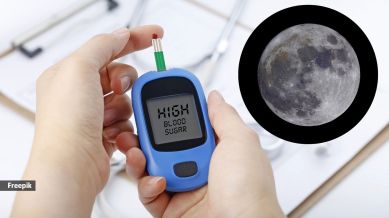📣 For more lifestyle news, click here to join our WhatsApp Channel and also follow us on Instagram
Can the moon’s phases really affect your blood sugar levels? An expert explains
The idea that lunar phases might also play a role is less explored but is gaining interest.

From sleepless nights during a full moon to changes in mood as the month progresses, many people believe the moon’s cycle has a subtle influence on our bodies. A growing curiosity is also emerging about whether it could affect something as critical as blood sugar.
While scientific research has long established that our blood glucose follows daily patterns influenced by circadian rhythms, the body’s 24-hour biological clock, the idea that lunar phases might also play a role is less explored but is gaining interest.
monthly limit of free stories.
with an Express account.
Some observational accounts suggest that fluctuations in energy levels, cravings, or even appetite might coincide with certain moon phases. But are these just coincidences, or could there be a biological mechanism at play?
According to Kanikka Malhotra, certified diabetes educator and clinical dietician at Health Pepper, “There’s no solid scientific proof that lunar phases, like the full or new moon, directly affect blood sugar levels in humans. Many cultural beliefs link the moon to changes in the body, but large, controlled studies have not shown a clear connection between lunar phases and glucose regulation. Blood sugar is mainly affected by diet, physical activity, stress, medications, and hormonal cycles. If you manage diabetes, it’s important to focus on these reliable factors instead of depending on lunar influences. For most people, adopting healthy habits is far more important than checking the calendar for moon phases.”
How do circadian rhythms influence glucose regulation, and could these rhythms be affected by the moon?
Malhotra states, “Circadian rhythms are our internal 24-hour clocks that help regulate hormone production, including insulin, which controls blood sugar. Disruptions to circadian rhythm—such as lack of sleep or irregular eating—can cause blood sugar fluctuations.”
However, she stresses that while the moon can affect sleep in some people, “scientific research does not robustly link lunar cycles to meaningful changes in circadian-driven glucose regulation.” Maintaining regular sleep and meal schedules has a much stronger, proven effect on your glucose control than tracking lunar events
If lunar cycles did affect blood sugar, how would this differ between people with diabetes and those without?
If lunar cycles did influence blood sugar, Malhotra believes that in such a scenario, people with diabetes might have experienced more noticeable effects because their glucose regulation is already compromised.
“However, current scientific studies have not shown clear differences in blood sugar changes during lunar phases for people with or without diabetes. Instead, diabetes management should focus on evidence-backed factors: medication adherence, consistent meal timing, physical activity, and stress management. Relying on lunar calendars for glucose control isn’t supported by science—attention to daily lifestyle habits is far more effective,” concludes the expert.
DISCLAIMER: This article is based on information from the public domain and/or the experts we spoke to. Always consult your health practitioner before starting any routine.
📣 For more lifestyle news, click here to join our WhatsApp Channel and also follow us on Instagram